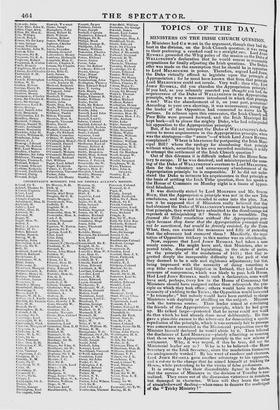TOPICS OF THE DAY.
MINISTERS ON THE IRISH CHURCH QUESTION, IF Ministers had tlle worst in the argument, though they bad the best in the division, on the Irish Church question, it was owing to their preferring a crooked road to a straight one. ill opposition RUSSELL grounded the Whig policy of the session on the Duke WELLINGTON'S declaration that he would concur in reasonablo propositions for finally adjusting the Irish questions. The Duke's offer was made on the assumption that he should be • to Lord MELBOURNE ill power. Therefore, argued Lord JoeN , the Duke virtually offered to legislate upon the principle of Appropriation ; for he must have known that from that principle Lord MELBOURNE could not recede. Very well : then why, Lord JOHN RussELL, did you abandon the Appropriation principle, If you had, as you solemnly asserted you thought you had, the acquiescence of the Duke of WELLINGTON in the Appropriation principle, why was a measure introduced in which that principle is not? Was the abandonment of it, on your part, gratuitous? According to your own showing, it was unnecessary, seeing that the leader of the Opposition had consented to waive his jections. In reliance upon this concession, the Irish Church and Poor Bills were pressed forward, and the Irish Municipal Bill kept back—all to please the mighty Duke, who bad relinquished his opposition to the Appropriation principle. But, if he did not interpret the Duke of WELLINGTON'S decla- ration to mean acquiescence in the Appropriation principle, where was the stratagem—the " snare "—of which Lord JOHN RUSSELL complained? Where is his excuse for postponing the Irish Muni. cipal Bill? where the apology for abandoning that principle without which, according to his own recorded resolution, it is folly to attempt the settlement of the Irish Church question ? Out of this dilemma it is difficult indeed for the Home Secre- tary to escape. If he was deceived, and misinterpreted the mean- ing of the Duke of WELLINGTON'S overture to Lord MELBOURNE, then for the voluntary and unnecessary abandonment of the Appropriation principle lie is responsible. It' he did not under- stand the Duke to intimate his acquiescence in that principle as the basis of settling the Irish Tithe question, then his speech in the House of Commons on Monday night is a tissue of hypocri. tical falsehood.
It was distinctly stated by Lord MORPETH and Mr. SPRING Rim that the Appropriation principle was not in the new Tithe resolutions, and was not intended to enter into the plan. Now, can it be supposed that if Ministers really believed that they had obtained the Duke of WELLINGTON'S consent to legislate upon - that principle, they would have submitted to the disadvantage and reproach of relinquishing it ? Surely this is incredible, They framed the Tithe resolution without the Appropriation prin- ciple because they knew that the Appropriation principle would not be sanctioned, but would be fiercely resisted, by the Tories. What, then, can exceed the meanness and fully of pretending that the adversary had ensnared them ? Manifestly, the impu- tation of Opposition trickery in this matter was an afterthought. Now, suppose that Lord JOHN RUSSELL had taken a more manly course. He might have said, that Ministers, after re- peated trials, despaired of legislating, in the state of parties, on the principle of the resolutions of 1835 ; that they re- gretted deeply the insuperable difficulty in the path of what they deemed to be a safe and righteous adjustment; but that, being impressed with the necessity of doing something to stop tithe conflicts and litigation in Ireland, they had framed a measure of compromise, which was likely to pass both Houses. Had Lord JOHN RUSSELL made such a declaration, some would have said, perhaps, (very few in the House of Commons,) that Ministers should have resigned rather than relinquish the prin- ciple on which they took office ; others would have regretted the necessity of yielding to the Tories ; the Opposition would have cried " Io triumph'';" but nobody would have been entitled to charge Ministers with duplicity or shunting on the subject. Ministers took the tortuous course. Their leader aimed at conciliating the friends of the Appropriation principle, which he had given up. He talked large—protested that be never could nor would do that which he had already done most deliberately. He thus gave a plausible excuse to the adversary' for demanding a specific repudiation of the principle, which it was certainly fair to presume was somewhere concealed in the Ministerial proposition since the Minister himself declared be would abide by it. Then followed the disclaimer of Lord MoneeTit—plainly admitting or asserting that throne was no Appropriation principle in the new scheme of settlement. Why, it was urged, if this be true, did not the Ministerial leader say so ? \V ho is to be believed—the Home Secretary or the Irish Secretary, since the resolutions themselves are ambiguously worded ? By his want of candour and clearness, I.ord JOHN RUSSELL gave another advantage to his epponents, and a colour to the charge that he aimed himself at tricking the House, while pretending to be the victim of false professions.
It is owing to this their discreditable figure in the debate, that the success of Ministers in the division of
tralized. They came out of the discussion victorious in numbers, but damaged in character. When will they learn the value of straightforward dealing—when cease to deserve the soubriquet of the " Tricky Ministry ?" Tuesday is nea-


























 Previous page
Previous page